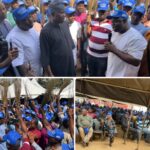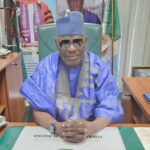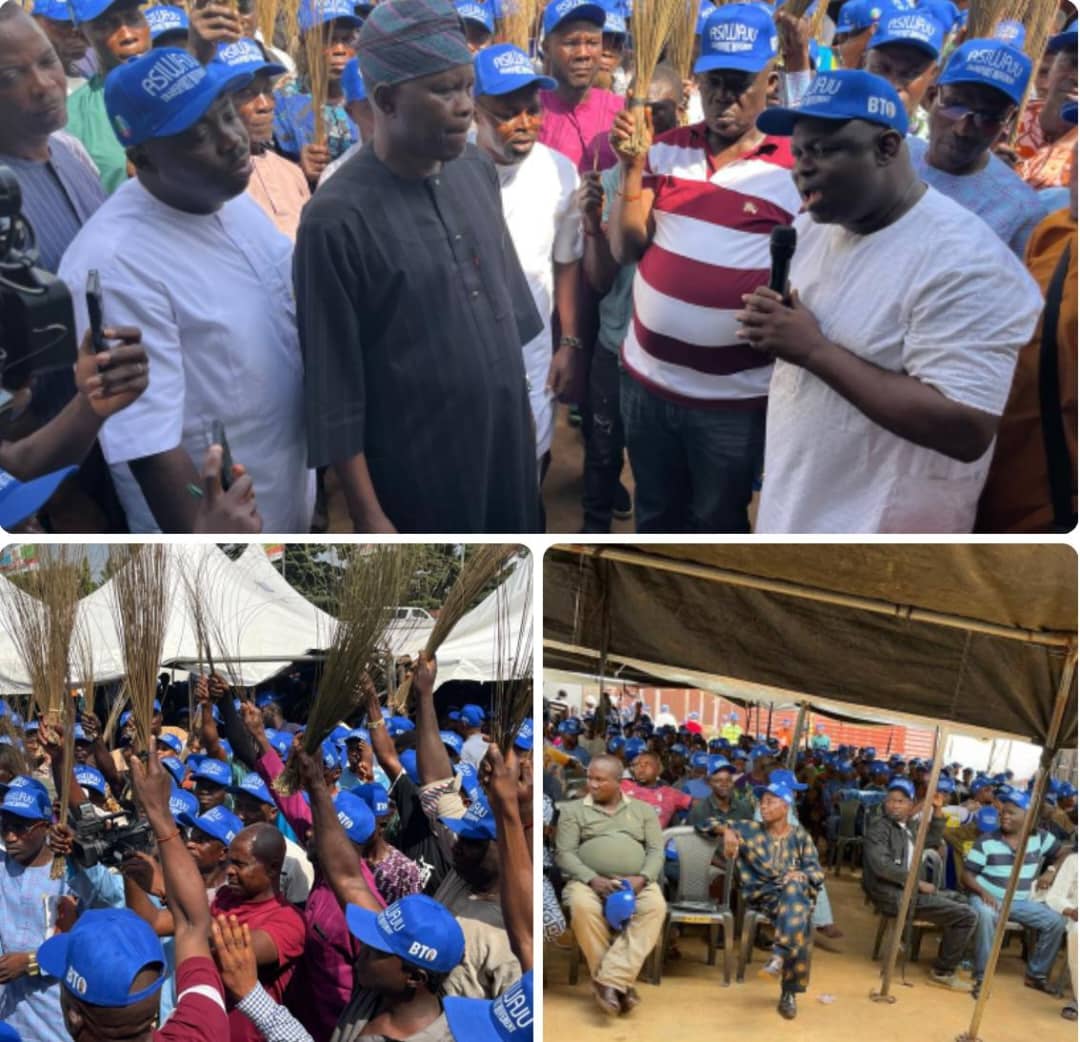THEOCRACY: THE THEO ADEBOWALE I KNOW
By: Rasaq Olasunkanmi
I got to know about the death of Dr Theophillus Adebowale through a Whatsapp platform of former students of the department of sociology at the Ondo State University, Ado-Ekiti (The University has the enviable record of highest number of transmutation in Nigeria from one name to the other, from Obafemi Awolowo University to Ondo State University Ado-Ekiti to University of Ado-Ekiti and to the present Ekiti State University).
The first thing that came to my mind after the initial shock of his demise was ‘was he yet to make the professorial cadre after all these years?’ Even when some of those he taught had become professors and associate professors, not to even talk of his contemporaries who had all become full-fledged professors’.
I do not claim to know Dr Theo Adebowale intimately. I do not know his family, how many children he had, the number of his siblings or even his spouse or the town he came from though; I suspect he is from either Ekiti or Ondo State. Even as a student of the great OSUA, I was not even in his department.
I was admitted into the sociology department while he was a lecturer in the department of political science. My interaction with him was limited to lecturer/student relationship which was cultivated through three of the courses he taught that I took. The courses were POS 103 (Principles of Politics), POS 102(Traditional Political Structure) and POS 212 (Public Administration).
In those days, the Faculty of the Social Sciences of the great OSUA used to be a simple row of about three or four blocks arranged horizontally housing the departments of political science, psychology and sociology. It was located at the eastern part of the campus.
The economics department as well as the newly created accounting and banking finance departments had a separate building further down the line along the route to the popular local eatery called Cholera Joint by students. Further ahead and due north of the Social Sciences was the Faculty of Science and their lecture rooms.
The Faculty of the Social Sciences had no lecture theatre of its own then but shared with the Faculty of Arts. Both Faculties of Art and Education were located at the western part of the campus, just a stone throw from the administration block. Faculty of Engineering was situated at the far northernmost part of the campus.
There was not a single storey building on campus then except for the gigantic administration building that was under construction which was financed by the great Ekiti philanthropist, Chief Omolayo.
This edifice was conspicuously located at the centre of the school, just ahead of the bus park. The school auditorium and a newly built modern lecture theatre were located not too far from the Omolayo building. The Student Union Building (SUB) was sited deep in the heart of the campus, roughly equidistant from the main Faculties.
The school library was at the centre. Mid way along the route from the Faculty of Art to the Social Sciences, there was the library by the right, which was built in the form of a ‘L’ shape. I have seen Dr Adebowale on more than two occasions in the library engrossed in research.
Dr Theo Adebowale, then Mr. Adebowale was one of the leading lights of the department of political science. Alongside Niyi Adeola and Kunle Ajayi (now a professor of political science recently appointed as a national commissioner in INEC), they were the Young Turks in the department.
The old order in the political science department then were represented by Dr Dipo Kolawole popularly called D.K, Dr Aigbogu, the international relations guru, Dr Femi Mimiko who later became a professor and vice chancellor of Adekunle Ajasin University, Akungba and Dr Isijola, the head of the department, popularly called ISI-J among others. Mr. Theophillus Adebowale was a towering intellectual figure in the department.
An uncompromising academic, he had a large student following which informed being nicknamed THEOCRACY which is a derivation of the shortened form of his first name corresponding to a form of government which he may have explained to students countless times. An erudite scholar, his short figure belies a giant intellect.
He had a cold exterior and a “no nonsense” mien. However, beneath the steel appearance lurked a very brilliant and humane mind.
An intellectual of Marxist persuasion, he was the toast of public lectures organized on campus as you are bound to learn something new with “Theo” as the guest speaker.
He was not only a Marxist but also a Marxian as he eschewed all forms of ostentatious and oppressive lifestyle and primitive acquisition. He had a simple outlook with a Spartan personality often associated with the great Teutonic theorist. When he bought a used Volvo car, the whole student population was happy for him.
Dr Theo can be considered as somewhat eccentric and unconventional in his ways, he belong to the group of rapidly depleting academics that bring no notes to the classroom, yet you can be assured of the deep intellectual contents of their delivery.
In those days, for you to register for a course, you have to take your registration form physically to the lecturer designated to teach the course for his or her signature. When I entered Dr Theophillus Adebowale’s office to register for a hundred level first semester political science course with my co-late registrants, he asked us to introduce ourselves and departments.
When it got to my turn, I told him my name and department. With a smirk, he corrected my pronunciation of sociology. I had pronounced it sociology, pronouncing the second syllable like a ‘she’. He corrected that the second syllables should be pronounced as in ‘see’.
In course of the several public lectures he gave, he corrected many other wrong pronunciations’ common and popular among students like ‘issue’, ‘argument’, ‘university’ among others.
His classes were always educative and orderly. The intellectual levels of his classes were very high. You would see students hanging to every words coming out of his mouth. He was always the quintessential teacher, a lord of the manor; like a god amidst his subject.
One practice common among some lecturers was the commercialization of instructional materials, popularly known as sales of handouts.
To use an expression by a professor then, ‘buying of handout is voluntarily compulsory’. What an ingenuity of oxymoronic paradox. Dr Theo never belonged to this group. On the few occasions he produced lecture notes in the form of handouts; it was only to capitulate to students’ pleas and demands.
For some unknown reasons, I can still recall snippets of some exact words he used when being taught by this great man. He had a way with his usage and combination of words which seem to give them a life when he pronounced them: ‘the claimants of economic pie are always at constant dissonance’ (when referring to clashes among political elites); a very powerful clique that might have seized power or might have got elected (when talking about unity of elites).
He had a way with words as if they pander to his usage of them. He was a master-orator; our own Cicero. He was fond of using the expression ‘science of politics’ which is indicative of his preference for the scientific approach in the study and understanding of politics as against the behaviorists’ perspective
By far, his penetrating analysis of the theory of prismatic society which he taught us in his public administration class remains an academic watershed. It represented an epistemic shift in knowledge production. It was thorough, detailed and well grounded in scientific research.
Years later, I would draw heavily on most of his insights on prismatic society during a postgraduate presentation in another university for which I received a standing ovation. Many thanks to the great ‘Theocracy’.
I recall one day while he was in class teaching when the whole campus erupted in ‘Aluta’.
The Student Union Government was mobilizing students to participate in the Aluta. Lecturers were hurriedly leaving classes and students were disrupting lectures by climbing tables and chairs to show solidarity with the protest. Surprising, it was only our class, with the great ‘Theo’ in control that was not part of the ‘collective behavior’.
No student dare climb the table in his class even in the middle of an Aluta. He continued his class as if oblivious of what was happening in his surrounding. It took the deliberate efforts and intervention of some of the executives of the Student Union Government to meet him and demand cessation of lecture.
He initially refused and a verbal disputation erupted between him and the SUG excos. After sometime, he deferred to their request and leave the class amidst thunderous shouts of ‘Theocracy’ among both students and the SUG excos.
At a time, he became avuncular. I think with the coming of middle age, he became more matured. He just informed some students that he preferred to be called uncle and not Theocracy anymore. And with a ’collective conscience’, the whole student population switched from calling him Theocracy to uncle. That shows the depth to which he was revered by the students. He was the only lecturer that could make such demand from students.
Despite the seriousness of academic business that permeated his classes, there were still rooms for some comic relief. Dr Adebowale was always picking on one Sister Oyindamola in our set. I shared a special bond with Sister Oyinda. She was in political science while I was admitted to study sociology. We had met at Ojota Motor Park while trying to board a commercial vehicle to Ado-Ekiti.
Sister Oyinda was as religious as they come. Though not particularly religious, I am a Muslim while sister Oyinda was a devout Christian. The type students used to refer to as S.U. We struck a special bond despite the polar differences in our religious beliefs and faiths. I cannot recall properly how Sister Oyinda got on Dr Theo’s radar, maybe partly because she was in his department and partly because of the funny ways she usually reacts to some issues, so he was always joking with her in the class, requesting her perspectives on issues, but never condescending or insulting to her person or belief.
Sometime in the first semester of our part two, some of us as student had trooped to his office to check the result of the course he took us in the second semester of part one. Trust him, in his eccentric ways, he asked us to form a queue and call out our matric number one after the other. As each person at the head of the queue calls out his or her matric number, he would glance at the result sheet he was holding to check the no called and without looking up, he will just say ‘passed’ or ‘failed’, without giving the score.
Occasionally, when he uttered passed for some students, he would glance up and look at such student critically before moving up to another student. What we did not know was that those he was sizing up after saying they passed were those that scored ‘A’ in the course. We got to know of that later when the result was pasted on their departmental ‘notice board’ as we used to call those information outlets then.
Time and space will not permit me to go on sharing the wonderful and timeless memories I have of this great mind. It is so unfortunate that the brains of intellectuals like Dr Theophillus Adebowale are not properly tapped to address some of our existential challenges.
A system that is not designed to throw up our best brains like Dr Adebowale is a faulty system that should be dismantled if we are serious about our development.
Adieu Theocracy
Adieu Uncle
Adieu Dr Theophillus Adebowale.
Some of us student will continue to treasure and cherish your memories and how instrumental you are in moulding our personalities.
Written by: Rasaq Olasunkanmi










